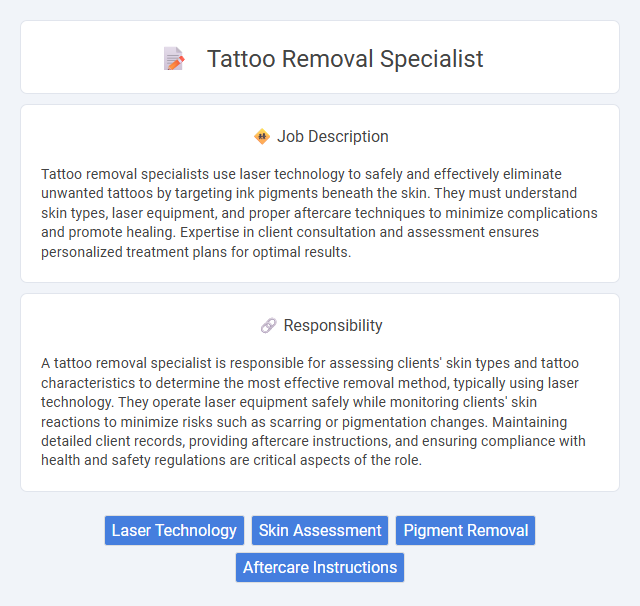
Tattoo removal specialists use laser technology to safely and effectively eliminate unwanted tattoos by targeting ink pigments beneath the skin. They must understand skin types, laser equipment, and proper aftercare techniques to minimize complications and promote healing. Expertise in client consultation and assessment ensures personalized treatment plans for optimal results.
Individuals with strong attention to detail and steady hands are likely well-suited for a tattoo removal specialist role, as precision is critical in safely targeting ink beneath the skin. Those comfortable working closely with clients who may experience emotional sensitivity about their tattoos might find this job fitting due to the need for empathy and excellent communication. Candidates with knowledge of laser technology and skin anatomy probably have a higher chance of success and satisfaction in this profession.
Qualification
Tattoo removal specialists require comprehensive training in laser technology, skin anatomy, and safe removal techniques to effectively erase tattoos while minimizing skin damage. Certification from recognized institutions in laser safety and dermatological procedures enhances their qualifications, ensuring adherence to medical standards. Extensive knowledge of various tattoo inks, skin types, and potential risks is essential for customizing treatment plans and achieving optimal results.
Responsibility
A tattoo removal specialist is responsible for assessing clients' skin types and tattoo characteristics to determine the most effective removal method, typically using laser technology. They operate laser equipment safely while monitoring clients' skin reactions to minimize risks such as scarring or pigmentation changes. Maintaining detailed client records, providing aftercare instructions, and ensuring compliance with health and safety regulations are critical aspects of the role.
Benefit
A tattoo removal specialist likely offers clients a path to clearer skin and renewed confidence by effectively eliminating unwanted ink. This profession probably provides opportunities to work with advanced laser technology, enhancing skills in a rapidly evolving field. The demand for tattoo removal services may lead to a stable career with potential for growth in cosmetic and dermatological sectors.
Challenge
Tattoo removal specialists likely face the challenge of accurately assessing diverse skin types to minimize scarring and pigmentation changes. The complexity of selecting appropriate laser settings for different ink colors and depths increases the probability of needing advanced technical skills. Managing client expectations about the number of sessions and potential discomfort could also present ongoing difficulties in this profession.
Career Advancement
Tattoo removal specialists benefit from advanced certifications in laser technology and dermatological safety, significantly enhancing career prospects. Mastery of diverse removal techniques and client consultation skills can lead to roles in medical aesthetics clinics or dermatology centers. Continuous education and specialization in emerging technologies promote opportunities for senior or managerial positions within the cosmetic and medical tattoo removal industry.
Key Terms
Laser Technology
A tattoo removal specialist expertly uses advanced laser technology to break down ink particles in the skin, enabling safe and effective pigment elimination. High-powered Q-switched lasers and PicoSure devices target different tattoo colors and depths, optimizing treatment precision and minimizing skin damage. Mastery in laser settings and skin type assessment ensures personalized and successful tattoo fading outcomes.
Skin Assessment
A tattoo removal specialist performs detailed skin assessments to evaluate the type, color, and depth of ink embedded in the dermis, essential for determining the appropriate laser treatment. Accurate skin analysis involves identifying skin type using Fitzpatrick scale, detecting any pre-existing skin conditions, and assessing potential scarring risks to ensure safe and effective removal. This precision enhances treatment outcomes, minimizes adverse effects, and customizes laser parameters according to individual skin responses.
Pigment Removal
A tattoo removal specialist expertly utilizes advanced laser technology to target and break down ink pigments embedded in the skin, promoting gradual fading and clearance. Mastery in pigment removal requires comprehensive knowledge of different ink colors, skin types, and laser wavelengths to achieve effective and safe results. Precision and understanding of skin healing processes are essential for minimizing scarring and ensuring optimal pigment elimination during treatment.
Aftercare Instructions
Tattoo removal specialists provide detailed aftercare instructions to minimize risks like infection, scarring, and pigmentation changes. Clients are advised to keep the treated area clean and dry, apply prescribed ointments, avoid sun exposure, and refrain from picking scabs to promote optimal healing. Adhering to these guidelines ensures better results and reduces complications after laser tattoo removal sessions.
 kuljobs.com
kuljobs.com